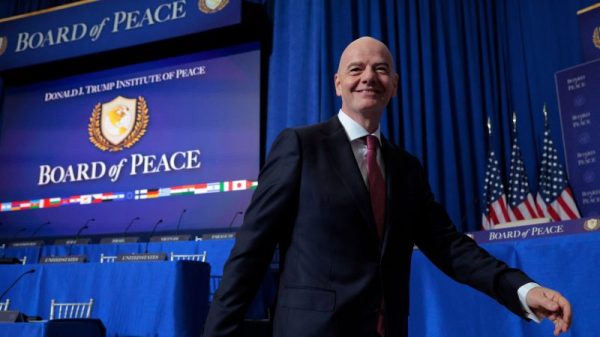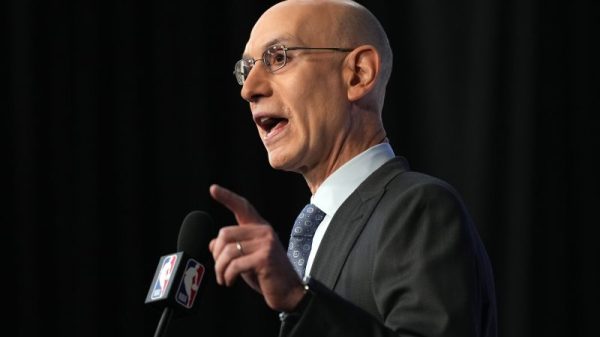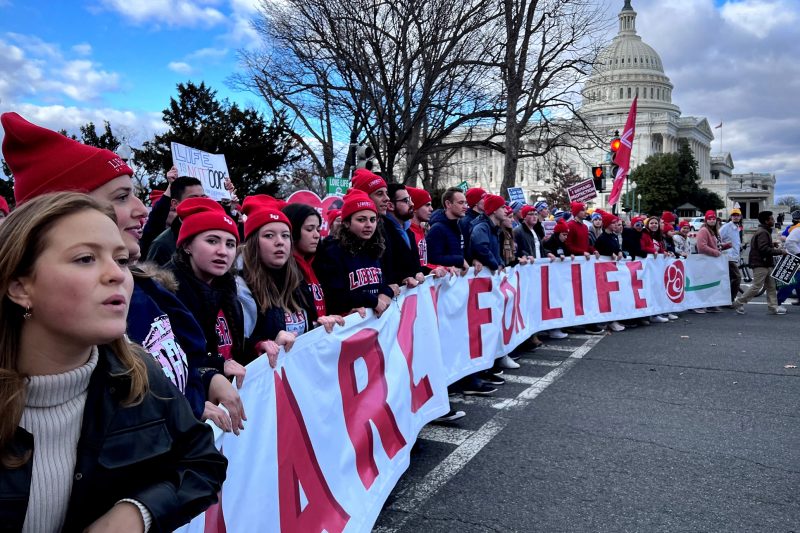Leaders of the antiabortion movement gathered in Donald Trump’s Mar-a-Lago office last week to head off what they viewed as a potential crisis.
The former president’s reelection campaign had recently said that abortion restrictions “should be decided at the state level.” Days later, his rival, former U.N. ambassador Nikki Haley, delivered a speech arguing against federal abortion limits that did not have enough votes to pass both chambers of Congress.
Trump’s guests, including Susan B. Anthony Pro-Life America President Marjorie Dannenfelser, Family Research Council President Tony Perkins and Sen. Lindsey O. Graham (R-S.C.), showed him polling from the GOP firm On Message Public Strategies suggesting that a majority of Americans supported limiting the procedure after 15 weeks.
They insisted that the federal government must still have a role. They reminded Trump of his performance at the 2016 Las Vegas presidential debate, when he used shocking language to describe Democratic support for exceedingly rare abortions in the latest stages of pregnancy, which are typically conducted only in cases of fetal anomaly or threats to the life of the mother.
Multiple people involved in the conversation say Trump got the message. Two days later, during a CNN town hall, he repeated almost word for word what they had discussed in his office, reframing the debate away from Republican plans and onto misleading claims of Democratic extremism.
“Remember the debate with Hillary Clinton?” Trump told CNN’s Kaitlan Collins. “And I said, ‘Rip the baby out of the womb at the end of the ninth month, they will kill the baby in the ninth month.’”
The moment was a win in a behind-the-scenes battle being waged by antiabortion activists and senior Republican officials to corral the party’s presidential candidates on an issue that has been widely viewed as kryptonite for the GOP since the Supreme Court overturned Roe v. Wade last year. They are using the early days of the presidential contest to coach Republicans across the country on the need to find their voice on the issue, while arguing that any retreat from long-held GOP orthodoxy on abortion will only feed the Democratic narrative.
“It’s a highly organic process involving the pro-life movement, the candidates and the Republican Party,” said Ralph Reed, the head of the Faith and Freedom Coalition. “The key is to celebrate the progress being made at the state level, oppose Biden’s pro-abortion agenda and hammer away that the real extremism is their goal of codifying Roe into law and using taxpayer funds to pay for abortions under Medicaid.”
The activists who met with Trump have warned that any effort to back away from national abortion restrictions, now that states can impose their own, would be a serious mistake, putting Republicans on defense and ceding ground in Democratic-dominated states.
“More and more people who are thinking about running for president, running for federal office, if they’re asked about abortion in Washington, you’ve got to have an answer,” Graham said. “The worst answer is the states’ rights issue. We tried that with slavery. It didn’t work very well.”
Two-thirds of Americans say they oppose the decision to eliminate the constitutional right to an abortion, including 54 percent who oppose it “strongly,” according to a Washington Post-ABC News poll released earlier this month. About 8 in 10 Americans say the decision on whether to have an abortion should be left to a woman and her doctor (78 percent), while about 2 in 10 (18 percent) say abortion should be regulated by law.
Dannenfelser — who is seeking to have meetings with all of the GOP presidential contenders — has argued that all Republicans have to support, at minimum, a bill put forward by Graham that limits abortion nationwide at 15 weeks, even though the bill lacks current prospects of passing into law. (Federal data shows about 93 percent of abortions are performed before 14 weeks of gestation. Only 1 percent of abortions occur after 21 weeks.)
Not all of the candidates agree.
Haley, so far the only woman running as a Republican for president, has argued that the best path for antiabortion advocates is to focus on the federal level on efforts where there is clear consensus and realistic chance of passing laws. She said in a Sunday interview on CBS’s “Face the Nation” that even a 20-week limit would not currently pass.
“Let’s be honest with the American people and say, ‘Let’s find national consensus,’” she said. “Let’s agree on, you know, getting rid of late-term abortions. Let’s agree on the fact that we need more adoptions. Let’s agree on the fact that we need accessible contraception. Let’s agree on the fact that mothers shouldn’t be jailed or go to, you know, get the death penalty for abortions.”
Dannenfelser, who has had a tense relationship with the Haley campaign since the candidate’s speech at the Susan B. Anthony Pro-Life America offices in April, responded by saying Haley’s position was “not acceptable.”
“Ambassador Haley is uniquely gifted at communicating from a pro-life woman’s perspective,” Dannenfelser said in a statement. “I look forward to confirmation of her concrete goals.”
Kellyanne Conway, a longtime Trump adviser and pollster who has been a leader in the antiabortion movement, said a 15-week limit on abortion is an effective way to put Democrats on defense on the issue.
“A 15-week limit, when nonpartisan doctors and scientists say a fetus can feel pain, is an easy opening bid for any Republican running for President; that’s second trimester, with exceptions for rape, incest and life of the mother; over 70 percent of the nation agrees,” she said in a statement. “This immediately smokes out the Democrats into admitting if not applauding their official position which is an absolutist abortion anytime, anyone, anyhow, anywhere.”
She also criticized Haley’s resistance to supporting a 15-week law. “If a president said from the beginning ‘I am not doing x because we don’t have the votes,’ Washington would not function,” Conway said. “If Nikki Haley truly believes that, she should suspend her presidential campaign immediately because at 4 percent in the polls, she herself ‘does not have the votes.’”
Haley spokeswoman Nachama Soloveichik said in a statement: “Nikki’s goal is to save as many babies as possible. As president, she will focus on pro-life policies that can pass Congress, like banning later-term abortion and making adoption easier. She believes we will save more babies by focusing on building consensus rather than playing into the hands of the left that tries to promote division.”
As president, Trump supported legislation that limited abortions after 20 weeks, with exceptions for rape, incest and the life of the mother. As a candidate, however, he has not yet said where he will draw the line on federal legislation since the Supreme Court ruling overturning the right to abortion, and he has suggested that his chief rival, Florida Gov. Ron DeSantis (R), went too far when he embraced a six-week limit at the state level.
In the meeting at his Mar-a-Lago estate, Trump told the group that he had concerns with bills that drew a line early in pregnancy, when women wouldn’t even know they were pregnant before it was too late to make a choice, according to a person familiar with the exchange, who spoke on the condition of anonymity to reveal internal discussions. He also talked about the need for exceptions but did not agree to any specific federal legislative approach, this person said. But he did pledge to attack Democrats on abortion and signaled openness to a national law.
“We’re in a position now — and I’m going to be leading the charge — we’re in a position now where we can get something that the whole country can agree with,” he said Tuesday in an interview with Newsmax. Trump said “a lot of people” support a 12-to-15-week limit.
“Ron, if you take a look, is losing women voters like crazy,” he added about DeSantis. “Many pro-life people, they are talking about more weeks than Ron is talking about.”
DeSantis has not said whether he supports a national abortion limit after a certain period of gestation, and his spokespeople did not respond Wednesday to a request for comment on the issue. He has criticized Trump for not saying explicitly whether he supports Florida’s six-week law, which abortion advocates have criticized because it would cut off access at a point when many women don’t know they are pregnant.
“As a Florida resident, he didn’t give an answer about would you have signed the heartbeat bill that Florida did that had all the exceptions that people talked about,” DeSantis said Tuesday, when asked about Trump’s comments on the six-week bill. “The legislature put it in. I signed the bill, I was proud to do it. He won’t answer whether he would sign it or not.”
According to federal data, about 6 in 10 abortions in the United States occur after six weeks of gestation, and Democratic strategists say such a position could be costly for DeSantis in a general-election campaign. At an event in Washington on Tuesday for the abortion rights group Emily’s List, Vice President Harris took aim at Republicans who support six-week laws, saying most of the men who support such bans “don’t even understand how a woman’s body works.”
In the Republican-dominated state of Kansas — where Trump won 56 percent of the vote in 2020 — nearly 60 percent of voters rejected a ballot measure in 2022 that would have declared there was no state constitutional right to abortion.
Other likely candidates for president have leaned in on the issue. Tim Scott, who is expected to announce his presidential campaign next week, has said he would sign a 20-week national ban if elected, but he has not yet committed to a 15-week ban. Former vice president Mike Pence, who is also preparing to announce a campaign, has backed the 15-week plan and publicly criticized Trump’s campaign for suggesting the issue should be left to the states.
“We’ve been given a new beginning for life in this country,” he said in Iowa last month. “I think we have an opportunity to advance the sanctity of life, move it ever closer to the center of American law.”
Marc Short, a top adviser to Pence, said Pence held a fundraiser for Dannenfelser’s group last week in Cincinnati and would be appearing with the group more often.
“Democrats insist that the repeal of Roe v. Wade represented a seismic shift in public opinion on abortion. But poll after poll show that’s not backed by evidence,” Dannenfelser said in a statement to The Post. “There are many examples from the midterms of winning Republicans who were staunch pro-life defenders that were up against Democrat darlings who refused to rebuke up-to-birth abortions.”



























